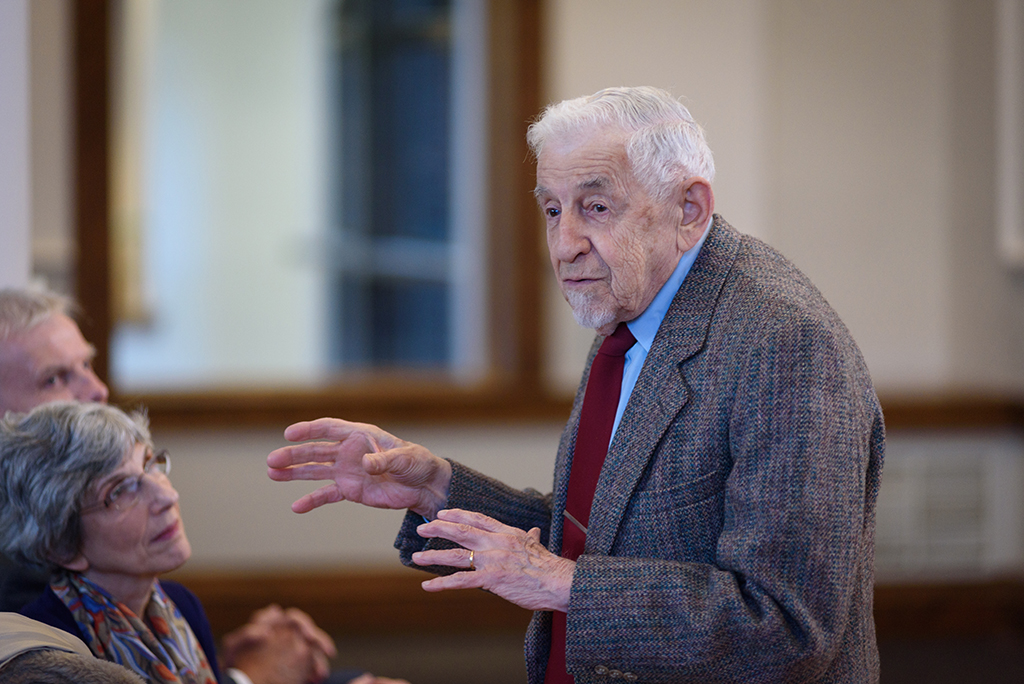In Memoriam
Lee Gurel never forgot the life-changing impact of a good teacher

Each summer for nearly 20 years, psychology teachers from around the country gathered on campus to attend a multi-day workshop funded by Lee Gurel ’48 and co-hosted by Clark University and the American Psychological Association.
Gurel was no disinterested donor. In fact, he was an eager participant who lived in the Blackstone residence hall alongside the visiting teachers and relished the traditional evening session, where they would come together to share lesson plans and discuss best practices.
“Lee took great pride in the workshop, and he loved being involved in the intellectual side of it,” recalled Nancy Budwig, professor of psychology and longtime organizer of the annual conference, which was held for the final time on campus earlier this month. “He was passionate about psychology and making sure teachers of high school psychology were well resourced and appreciated, as they often held the key to igniting interest in the next generation of psychology majors.”
Gurel, whose history of philanthropy at Clark included significant gifts in the areas of psychology, urban education, and Asian studies, passed away on July 24.
Gurel grew up in Worcester and attended the former Woodland Street Elementary School, which is now Carlson Hall, home of Clark’s School of Management. After earning his bachelor’s degree from Clark in 1948, he obtained his master’s and doctoral degrees in psychology from Purdue University and enjoyed a long career as a research psychologist with the Veterans Administration. He last held the position of chief of research in mental health and behavioral sciences at the Washington, D.C., VA Hospital. He retired from full-time work in the early 1990s.
His love of learning inspired him to make a $500,000 gift to the Mosakowski Institute for Public Enterprise in 2008 to support and amplify Clark’s efforts in the area of urban education. Previously, he’d established the Lee Gurel/John E. Bell Endowed Student/Faculty Achievement Award, which recognizes an outstanding student in psychology and the professor the student deemed most crucial to his or her success, and the Gurel Asian Studies Endowed Fund, which offers an annual prize to outstanding students in Asian studies. In 2017 he established a bequest for Clark which will create two new endowed funds: the Dr. Lee Gurel ’48 Scholarship, which will provide financial assistance to undergraduate students majoring in psychology, and the Dr. Lee Gurel ’48 Student Emergency Assistance Fund to help students who encounter unforeseen circumstances that may curtail their academic trajectories.
Gurel often compared the kind of giving that advances and supplements the education of others to the repayment of a bank loan, except the debt being repaid honors the teachers who enrich you with knowledge and direction in life. “Ideally,” he said, “we should feel the obligation [to give] as a moral imperative as binding as a legal requirement.”
The APA conference launched in 2004 with Gurel’s insistence that high school psychology teachers need professional development to allow them to teach classes that are more comparable to college-level intro courses. For 19 years (except for the two years the workshop was suspended because of COVID), the conference has attracted about 25 teachers each summer to Clark, where they learn from master teachers, share resources, and build professional communities. This July, teachers arrived at Clark from as far away as California, Oregon, and North Dakota.
While Gurel was unable to attend this year’s conference, Budwig said he would have been keen to know that the workshop provided participants with rich learning experiences and the chance to share their commitment to good teaching. She expects he also would have been interested to learn more about the political challenges faced by some teachers when addressing topics typically covered in introductory psychology like gender identity and diversity, equity and inclusion.
“Lee was someone who cared deeply about Clark and the opportunities Clark provided him and others like him,” Budwig said. “His generosity, humble nature, and his belief in the importance of quality teaching were clear to anyone who had the privilege of meeting him.”


